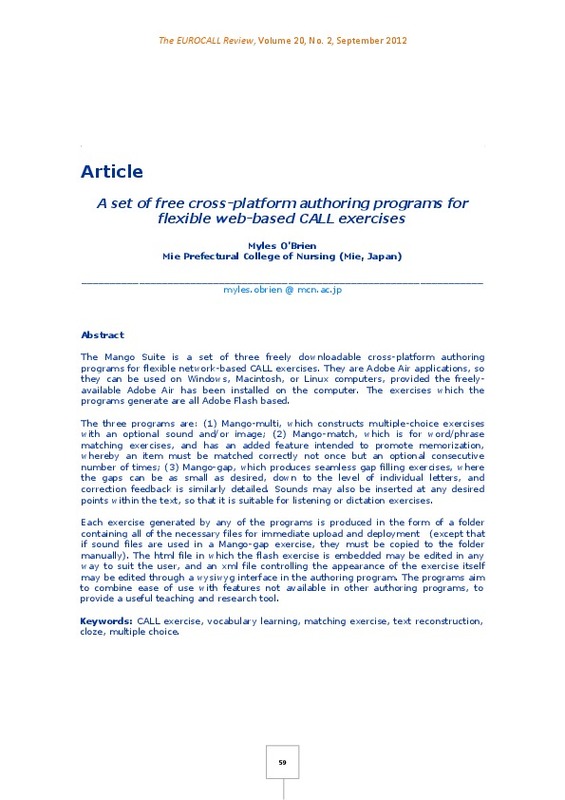Butler, A. C. and Roediger, H. L. (2008). Feedback enhances the positive effects and reduces the negative effects of multiple-choice testing. Memory & Cognition, 36(3): 604-616. Available from: http://duke.edu/~ab259/pubs/Butler&Roediger(2008).pdf https://doi.org/10.3758/MC.36.3.604
Folse, K. S. (2004). Vocabulary Myths: Applying Second Language Research to Classroom Teaching. Ann Arbor: University of Michigan Press. https://doi.org/10.3998/mpub.23925
Godwin-Jones, R. (2010). Emerging technologies - from memory palaces to spacing algorithms: approaches to second-language vocabulary learning. Language Learning & Technology, 14(2): 4-11. Available from: http://llt.msu.edu/vol14num2/emerging.pdf
[+]
Butler, A. C. and Roediger, H. L. (2008). Feedback enhances the positive effects and reduces the negative effects of multiple-choice testing. Memory & Cognition, 36(3): 604-616. Available from: http://duke.edu/~ab259/pubs/Butler&Roediger(2008).pdf https://doi.org/10.3758/MC.36.3.604
Folse, K. S. (2004). Vocabulary Myths: Applying Second Language Research to Classroom Teaching. Ann Arbor: University of Michigan Press. https://doi.org/10.3998/mpub.23925
Godwin-Jones, R. (2010). Emerging technologies - from memory palaces to spacing algorithms: approaches to second-language vocabulary learning. Language Learning & Technology, 14(2): 4-11. Available from: http://llt.msu.edu/vol14num2/emerging.pdf
Goto, T., Kojiri, T., Watanabe, T., Iwata, T. and Yamada, T. (2010). Automatic Generation System of Multiple-Choice Cloze Questions and its Evaluation. Knowledge Management & E-Learning, 2(3): 210-224. Available from: http://kmel-journal.org/ojs/index.php/online-publication/article/view/72/53
Hewer, S. (2011). Text Manipulation. In: Davies, G. (ed.) Introduction to Computer Assisted Language Learning (CALL) - Module 1.4 of Information and Communications Technologies for Language Teachers (ICT4LT), Slough: Thames Valley University [Online]. Available from: http://www.ict4lt.org/en/en_mod1-4.htm#textmanip
Horst, M., Cobb, T. and Nicolae, I. (2005). Expanding academic vocabulary with an interactive on-line database, Language Learning & Technology, 9(2): 90-110. Available from: http://llt.msu.edu/vol9num2/horst/default.html
Kim, D., & Gilman, D. A. (2008). Effects of Text, Audio, and Graphic Aids in Multimedia Instruction for Vocabulary Learning. Educational Technology & Society, 11(3), 114-126. Available from: http://www.ifets.info/journals/11_3/9.pdf
Krashen, S. D. (1981). Principles and Practice in Second Language Acquisition. London: Prentice-Hall International.
Ma, Q, and Kelly, P. (2006). Computer assisted vocabulary learning: design and evaluation. Computer Assisted Language Learning, 19(1), 15-45. https://doi.org/10.1080/09588220600803998
Nakata, T. (2008). English vocabulary learning with word lists, word cards and computer: implications from cognitive psychology research for optimal spaced learning. ReCALL, 20(1): 3-20. https://doi.org/10.1017/S0958344008000219
Pino, J., Heilman, M. and Eskenaz, M. (2008). Selection Strategy to Improve Cloze Question Quality. In: Intelligent Tutoring Systems for Ill-Defined Domains: Assessment and Feedback in Ill-Defined Domains, Proceedings of the 9th International Conference on Intelligent Tutoring Systems, Montreal Canada: 22-34. Available from: http://www.philippe-fournier-viger.com/ill-defined/Workshop-ITS08-ill-defined.pdf
Roediger, H. L. and Marsh, E.J. (2005). The Positive and Negative Consequences of Multiple-Choice Testing. Journal of Experimental Psychology: Learning, Memory, and Cognition, 31(5): 1155-1159. Available from: http://www.niu.edu/~britt/courses/Roediger_Marsh_pos_neg_testing.pdf https://doi.org/10.1037/0278-7393.31.5.1155
Yun, S., Miller, P. C., Baek, Y., Jung, J. and Ko, M. (2008). Improving recall and transfer skills through vocabulary building in web-based second language learning: An examination by item and feedback type, Educational Technology & Society, 11(4): 158-172. Available from: http://www.ifets.info/journals/11_4/12.pdf.
[-]







![HTML file [HTML]](/themes/UPV/images/html.png)

